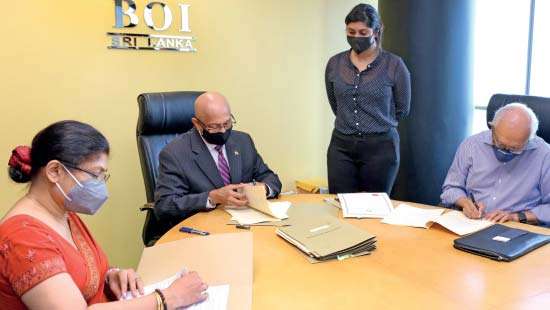The Board of Investment (BOI) enterprises recently entered into supplementary agreements collectively worth US$ 165 million to expand their existing operations, BOI officials said. .
BOI Chairman Raja Edirisuriya and Director General Renuka Weerakone signed the agreements on behalf of the BOI.
Aitken Spence (apparel), Asia Pacific Institute of Information Technology, Bodyline, Dialog Axiata, DPL Premier, DPL Universal Glove, Drivima Lanka, EPL Global Freeport, Everest Industrial Lanka ,Golden Star, Inoversal Labels, International Institute of Health Science, MAS Legato, Nature Export, Shiran Apparel, Trischel Fabric and Unichela entered into agreements to expand their current existing projects.
These investments represented diversified sectors such as the apparel manufacturing and accessories, assembling of refrigerators and cooler accessories for commercial purposes, healthcare education training, business process outsourcing services, hub operation activities to facilitate entreport trading, telecommunication infrastructure, tertiary education in information technology (IT), accessories for the hospitality sector and industrial rubber gloves.
BOI Chairman Edirisuriya said, “Despite the slowdown of economic activities in the world due to COVID pandemic, we are delighted to welcome the existing investors, who have initiated re-investments under the purview of the BOI.
We are also overwhelmed by the confidence placed by the existing investors about the economic policies pursued by the government. This is a welcoming boost to the country’s stability of the economy, she added.
Foreign Direct Investment has been on a falling trend since its record high of 1.8 billion US dollars in 2018 thanks to the sale of Hambantota port to a Chinese firm.
The FDI in 2019 fell to 793 million US dollars and last year it recorded 548 million US dollars.
The policy consistency, difficulties in opening and doing business and exchange rate risks have been the key concerns of foreign investors.
The government interventions with sudden change in policies including expropriation have dented investor sentiment on Sri Lanka despite the end of long conflict in 2009. A
nalysts have said that ‘regime uncertainty’ which attenuates private sector profits including expropriation along with monetary instability from a Latin America style central bank and nationalism as key problems for both foreign investors and ordinary citizens to build a house or buy a car..
“Overall goal of the country is to get the policies right for this country to double the GDP in next 10 years.” They said.“Covering investment climate and value propositions, ensuring and maintaining and retaining the value propositions, are absolutely necessary.”
So in terms of minimum inconsistencies I look forward to, in terms of policies.Many foreign investors who wanted to start businesses in the past have been compelled to choose some other peers because of long delays, alleged corruption, and bureaucratic bottlenecks which are yet to be addressed, they pointed out.
